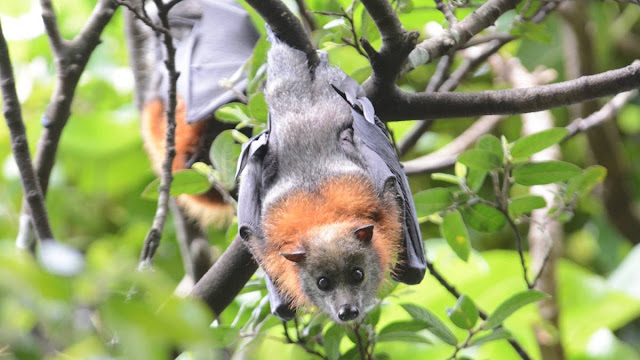Bat Issues | Wingham Brush grey-headed flying fox population dramatically reduced
While news comes out of Sydney yesterday, January 8, of hundreds of bat deaths due to horrendous heat wave conditions, relief is palpable in the Cain’s Wingham household that the same hasn’t happened at the Brush.
FAWNA bat carer Margaret Cain said she and her husband, Danny, were doing ‘happy dances’ yesterday after a visit to the Brush revealed no dead bats, despite the heat wave we are currently experiencing.
“We went down to the brush yesterday, and we got out of it scot-free. Not one dead bat,” Margaret says.
She was dreading what would face them as they entered the Brush, and she took a long a big garbage bag, expecting the worse.
“In previous years we’ve just filled up garbage bags. So the fact that we got out of it was the best blessing,” Margaret says.
She puts the happy find down to two reasons: one, that the canopy at the Brush currently is “really good”, and two, that the population of bats at the Brush has dramatically reduced.
Normally, the Brush would house a camp of around 200,000 flying foxes in the maternity season (spring to autumn). Margaret estimates this year there are only around 60,000 to 80,000 calling the camp home.
“I would say we’ve got definitely more than a winter camp,” Margaret says. But she is puzzled as to why the camp is so much smaller this year.
This reduced camp follows a horrendous season at the Brush last year that saw thousands of grey-headed flying fox babies die due to drought, followed by hundreds of black flying foxes dying later in the season due to a heat wave.
While Margaret is concerned at the reduction in numbers, it is also very good news for the ones that are living there, as they didn’t have to jostle for shade.
Margaret thinks the Brush camp might be smaller as a result of normal flying fox residents dispersing to other camps further south this time around.
“I think they’ve gone down to other camps, and they got nailed with the heat,” Margaret says.
Camps in Newcastle and Sydney have not fared so well over the past week, with 26 flying foxes needing care being transported from Newcastle to the Cains, Port Macquarie and Kempsey for help.
The hail hits, the leaves come off canopies, the bats that did survive have got no shade, and the camp comes down.
Margaret Cain
“Kempsey got nailed with hail, but they don’t have that many up there at the moment either. They seem to have dispersed to other areas,” Margaret says.
Heat and drought are not the only worries for flying fox colonies – thunderstorms can have serious consequences for the population, including death from serious head injuries.
“The hail hits, the leaves come off canopies, the bats that did survive have got no shade, and the camp comes down,” Margaret explains.
For now, though, Margaret and Danny are just grateful and relieved that our camp is unscathed so far, and are now praying for decent rain.
“We need rain now, regularly, to keep the Brush dampish.”








COMMENTS